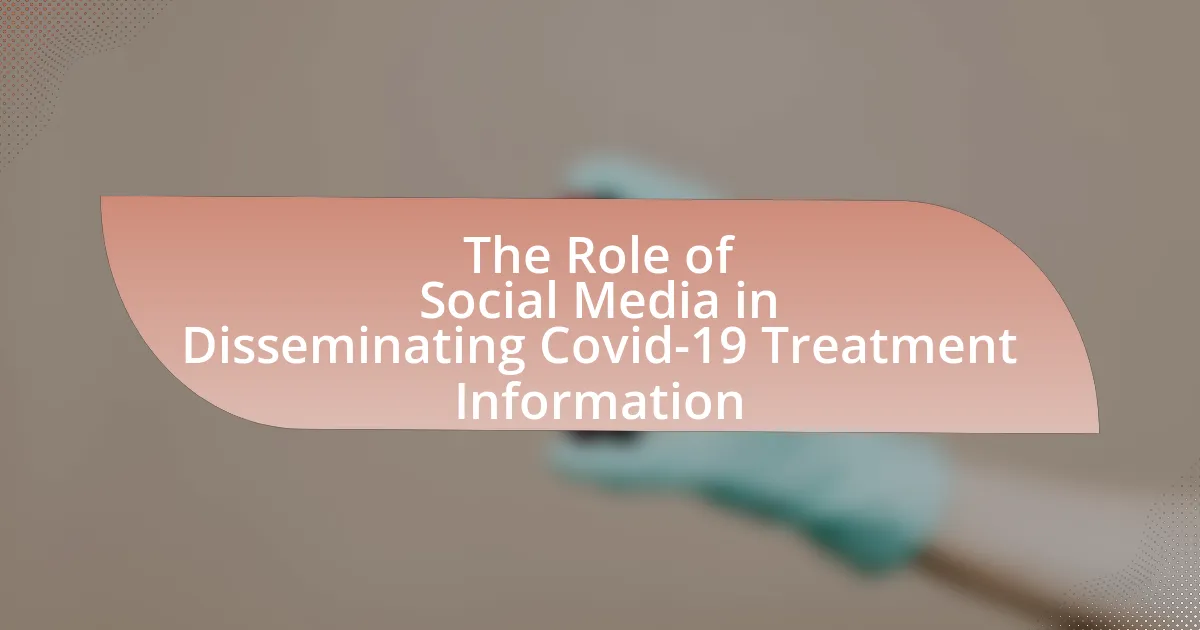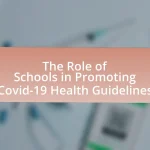The article examines the critical role of social media in disseminating Covid-19 treatment information, highlighting how platforms like Twitter, Facebook, and Instagram have been utilized by health organizations and professionals to share updates, guidelines, and counter misinformation. It discusses the transformation of health communication during the pandemic, the influence of user demographics on information dissemination, and the benefits of rapid information sharing. Additionally, the article addresses challenges such as misinformation, ethical considerations, and strategies for effective communication, emphasizing the importance of engagement and collaboration with credible sources to enhance public understanding of Covid-19 treatments.
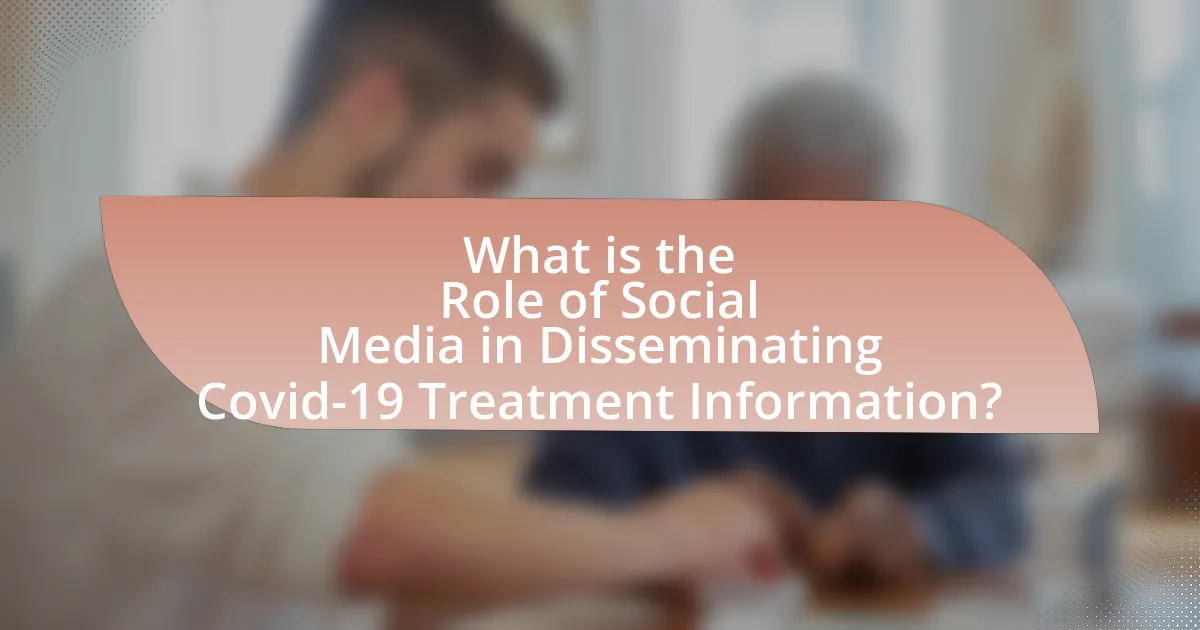
What is the Role of Social Media in Disseminating Covid-19 Treatment Information?
Social media plays a crucial role in disseminating Covid-19 treatment information by providing a rapid and widespread platform for sharing updates, guidelines, and research findings. During the pandemic, platforms like Twitter, Facebook, and Instagram have been utilized by health organizations, governments, and medical professionals to communicate essential information, such as treatment protocols and vaccine developments, directly to the public. For instance, the World Health Organization (WHO) and the Centers for Disease Control and Prevention (CDC) have actively used social media to counter misinformation and promote accurate health advice, reaching millions of users globally. This immediate access to information has been vital in shaping public understanding and response to Covid-19 treatment options.
How has social media changed the landscape of health communication during the pandemic?
Social media has transformed health communication during the pandemic by enabling rapid dissemination of information and facilitating real-time engagement between health authorities and the public. Platforms like Twitter and Facebook have allowed organizations such as the World Health Organization to share updates, guidelines, and educational content instantly, reaching millions globally. For instance, a study published in the Journal of Medical Internet Research found that social media was a primary source of COVID-19 information for 44% of respondents, highlighting its critical role in shaping public awareness and behavior. This shift has also led to increased misinformation, prompting health organizations to actively counter false narratives through targeted campaigns on these platforms.
What platforms are most commonly used for sharing Covid-19 treatment information?
The platforms most commonly used for sharing Covid-19 treatment information include Facebook, Twitter, Instagram, and YouTube. These social media platforms facilitate rapid dissemination of information due to their extensive user bases and real-time communication capabilities. For instance, a study published in the Journal of Medical Internet Research found that Twitter was particularly effective for sharing health-related information during the pandemic, with millions of tweets related to Covid-19 treatment being posted daily. Additionally, Facebook groups and pages have served as vital resources for community support and information sharing, while YouTube has been utilized for educational videos by health professionals.
How do user demographics influence the dissemination of treatment information on social media?
User demographics significantly influence the dissemination of treatment information on social media by affecting the reach, engagement, and credibility of the content shared. For instance, younger users, who are more active on platforms like Instagram and TikTok, tend to share health information more frequently, leading to rapid dissemination among their peers. In contrast, older demographics may prefer Facebook, where they engage with content differently, often valuing detailed information and community discussions.
Research indicates that demographic factors such as age, gender, and education level shape how users interact with health-related content. A study published in the Journal of Medical Internet Research found that younger individuals are more likely to trust and share health information from social media influencers, while older adults rely on information from established health organizations. This variation in trust and sharing behavior directly impacts how treatment information spreads across different platforms, highlighting the importance of tailoring communication strategies to specific demographic groups for effective dissemination.
What are the key benefits of using social media for Covid-19 treatment information dissemination?
The key benefits of using social media for Covid-19 treatment information dissemination include rapid information sharing, broad reach, and real-time engagement with the public. Social media platforms enable health organizations and authorities to disseminate updates and guidelines quickly, reaching millions of users instantly. For instance, during the pandemic, the World Health Organization utilized platforms like Twitter and Facebook to share critical health information, which contributed to increased public awareness and compliance with health measures. Additionally, social media facilitates two-way communication, allowing users to ask questions and receive timely responses from health professionals, thereby enhancing understanding and trust in treatment protocols.
How does social media enhance the speed of information sharing?
Social media enhances the speed of information sharing by enabling instantaneous communication across vast networks. Platforms like Twitter and Facebook allow users to disseminate news and updates in real-time, reaching millions within seconds. For instance, during the COVID-19 pandemic, information about treatment protocols and health guidelines spread rapidly through social media, with studies indicating that tweets related to COVID-19 reached over 1.5 billion impressions in just a few months. This rapid sharing is facilitated by the viral nature of content, where users can easily share, retweet, or repost information, amplifying its reach and impact.
What role does social media play in combating misinformation about Covid-19 treatments?
Social media plays a crucial role in combating misinformation about Covid-19 treatments by facilitating the rapid dissemination of accurate information and enabling public health organizations to engage directly with the community. Platforms like Twitter and Facebook allow health authorities, such as the World Health Organization and the Centers for Disease Control and Prevention, to share verified data and counter false claims in real-time. For instance, a study published in the Journal of Medical Internet Research found that timely interventions on social media significantly reduced the spread of misleading information regarding Covid-19 treatments, demonstrating the effectiveness of these platforms in promoting accurate health messaging.
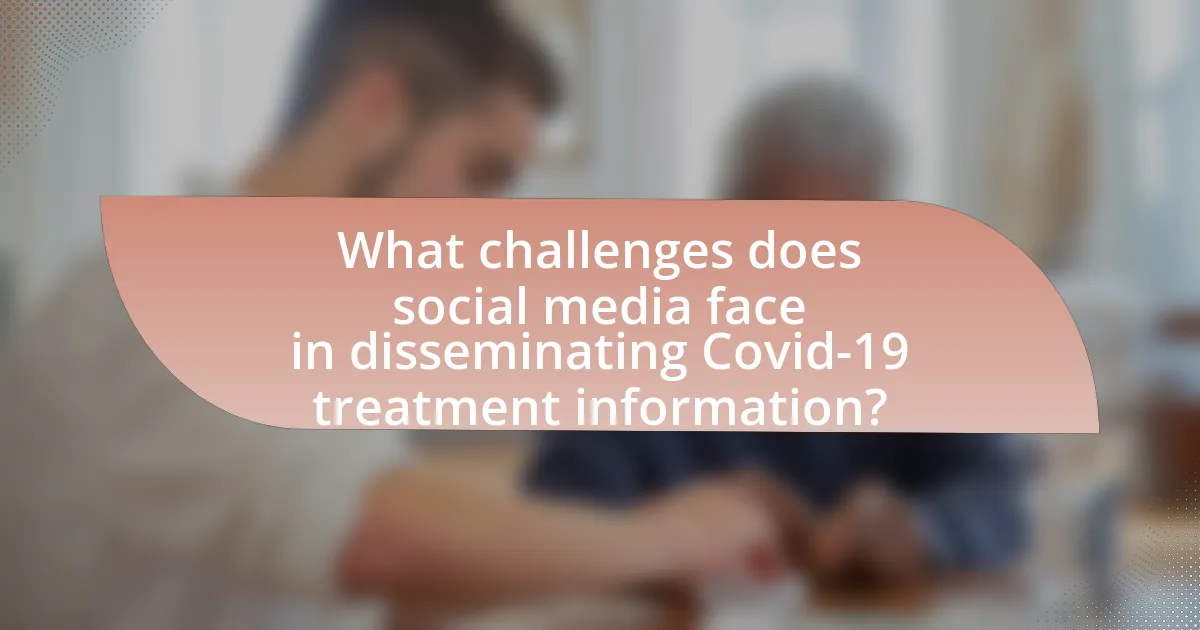
What challenges does social media face in disseminating Covid-19 treatment information?
Social media faces significant challenges in disseminating Covid-19 treatment information, primarily due to the spread of misinformation and the rapid evolution of scientific knowledge. Misinformation can lead to public confusion and mistrust, as seen during the pandemic when false claims about treatments circulated widely, undermining credible health guidance. Additionally, the fast-paced nature of social media often prioritizes sensationalism over accuracy, making it difficult for users to discern reliable information. Research from the Pew Research Center indicates that 64% of Americans believe misinformation has caused confusion about Covid-19, highlighting the impact of these challenges on public understanding and health outcomes.
How does misinformation impact public perception of Covid-19 treatments?
Misinformation significantly distorts public perception of Covid-19 treatments by fostering confusion and mistrust in scientifically validated options. Studies indicate that exposure to false information can lead individuals to reject effective treatments, as seen in the widespread skepticism towards vaccines and antiviral medications. For instance, a survey conducted by the Pew Research Center found that 29% of Americans believed misinformation about Covid-19 treatments, which directly correlated with lower vaccination rates and adherence to public health guidelines. This phenomenon illustrates how misinformation can undermine public health efforts and complicate the management of the pandemic.
What strategies can be employed to mitigate the spread of misinformation on social media?
To mitigate the spread of misinformation on social media, platforms can implement fact-checking systems and promote media literacy among users. Fact-checking systems, such as those employed by Facebook and Twitter, involve verifying claims made in posts and labeling or removing false information, which has been shown to reduce the visibility of misleading content. Additionally, promoting media literacy through educational campaigns helps users critically evaluate the information they encounter, as evidenced by studies indicating that informed users are less likely to share false information. These strategies, when combined, create a more informed user base and a more reliable information ecosystem on social media.
How do algorithms affect the visibility of accurate treatment information?
Algorithms significantly influence the visibility of accurate treatment information by prioritizing content based on user engagement and relevance metrics. Social media platforms utilize algorithms to determine which posts appear in users’ feeds, often favoring sensational or popular content over factual accuracy. For instance, a study by the Pew Research Center found that misinformation spreads more rapidly on social media due to algorithmic amplification, which can overshadow reliable sources. Consequently, this algorithmic bias can lead to a distorted perception of treatment options, as users may encounter misleading information more frequently than scientifically validated data.
What ethical considerations arise from using social media for health information dissemination?
Using social media for health information dissemination raises several ethical considerations, primarily concerning misinformation, privacy, and the potential for harm. Misinformation can spread rapidly on social media platforms, leading to public confusion and potentially dangerous health behaviors, as evidenced by the World Health Organization’s report on the “infodemic” during the COVID-19 pandemic. Privacy concerns arise when personal health information is shared or discussed in public forums, risking breaches of confidentiality. Additionally, the lack of regulation on social media content can result in the promotion of unverified treatments, which may cause harm to individuals seeking reliable health guidance. These ethical issues highlight the need for responsible communication and oversight in the dissemination of health information through social media channels.
How can privacy concerns be addressed when sharing health-related content?
Privacy concerns can be addressed when sharing health-related content by implementing strict data protection measures and ensuring informed consent from individuals whose information is shared. Organizations can utilize encryption technologies to safeguard personal data and anonymize health information to prevent identification of individuals. According to a study published in the Journal of Medical Internet Research, 70% of users expressed a preference for platforms that prioritize privacy and data security when sharing health information. This highlights the importance of transparency in data usage and the need for clear privacy policies that inform users about how their data will be handled.
What responsibilities do social media platforms have in regulating health information?
Social media platforms have the responsibility to monitor and regulate health information to prevent the spread of misinformation. This includes implementing policies that identify and remove false claims about health treatments, particularly during public health crises like the COVID-19 pandemic. For instance, platforms like Facebook and Twitter have established fact-checking partnerships and content moderation systems to address misleading health information, which is crucial given that studies show misinformation can significantly influence public behavior and health outcomes. According to a study published in the American Journal of Public Health, misinformation about COVID-19 treatments led to confusion and harmful practices among the public, highlighting the urgent need for social media platforms to actively manage the accuracy of health-related content.
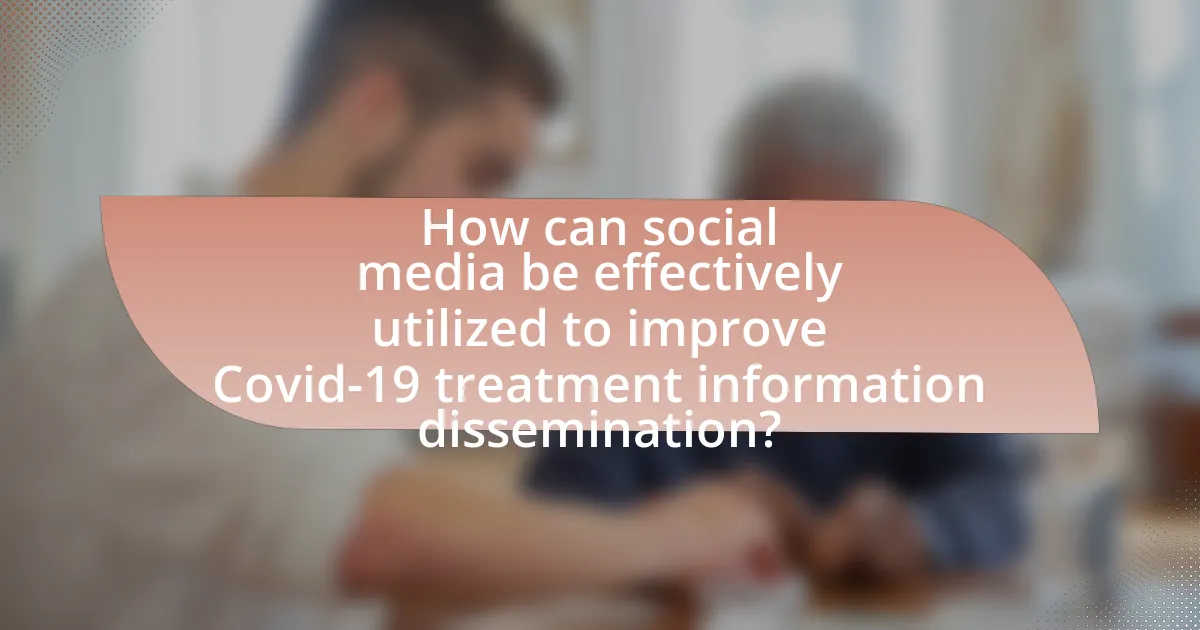
How can social media be effectively utilized to improve Covid-19 treatment information dissemination?
Social media can be effectively utilized to improve Covid-19 treatment information dissemination by leveraging its vast reach and real-time communication capabilities. Platforms like Twitter, Facebook, and Instagram allow health organizations and professionals to share accurate, timely updates and guidelines directly with the public. For instance, the World Health Organization (WHO) used social media to disseminate critical information about Covid-19 symptoms, prevention measures, and treatment options, reaching millions globally within hours. Studies indicate that social media campaigns can significantly increase public awareness and knowledge about health issues, as evidenced by a 2020 study published in the Journal of Medical Internet Research, which found that targeted social media interventions improved understanding of Covid-19 among diverse populations.
What best practices should health organizations follow when using social media?
Health organizations should prioritize transparency, accuracy, and engagement when using social media. Transparency involves openly sharing information about Covid-19 treatments and organizational practices, which builds trust with the audience. Accuracy is crucial; organizations must ensure that all shared content is based on credible sources, such as peer-reviewed studies or guidelines from health authorities like the World Health Organization. Engagement with the audience through responding to inquiries and addressing misinformation fosters a supportive community and enhances public understanding. According to a study published in the Journal of Medical Internet Research, effective social media strategies can significantly improve public health communication and information dissemination during health crises.
How can engagement strategies enhance the reach of treatment information?
Engagement strategies can enhance the reach of treatment information by fostering active participation and interaction among users. When individuals engage with content through likes, shares, and comments, it increases visibility and encourages algorithmic promotion on social media platforms. For instance, a study by the Pew Research Center found that social media users who actively engage with health-related content are more likely to share that information within their networks, thereby amplifying its reach. Additionally, tailored engagement strategies, such as interactive polls or Q&A sessions, can create a sense of community and trust, leading to higher dissemination rates of treatment information.
What role do influencers play in promoting accurate Covid-19 treatment information?
Influencers play a crucial role in promoting accurate Covid-19 treatment information by leveraging their large followings to disseminate verified health guidelines and updates. Their ability to reach diverse audiences allows them to counter misinformation and encourage adherence to public health recommendations. For instance, a study published in the Journal of Medical Internet Research found that social media influencers significantly impacted vaccine acceptance by sharing credible information from health authorities. This demonstrates that influencers can effectively bridge the gap between scientific data and public understanding, thereby enhancing the overall dissemination of accurate Covid-19 treatment information.
What tools and resources are available for effective social media communication regarding Covid-19 treatments?
Effective social media communication regarding Covid-19 treatments can be achieved through various tools and resources, including content management systems, analytics platforms, and educational materials. Content management systems like Hootsuite and Buffer allow organizations to schedule and manage posts across multiple platforms, ensuring timely dissemination of information. Analytics platforms such as Google Analytics and Facebook Insights provide data on audience engagement and reach, enabling adjustments to communication strategies based on performance metrics. Additionally, resources like the World Health Organization’s Covid-19 communication toolkit offer guidelines and materials for accurate messaging, ensuring that information shared is reliable and evidence-based. These tools collectively enhance the effectiveness of social media communication in conveying critical information about Covid-19 treatments.
How can analytics be used to measure the effectiveness of social media campaigns?
Analytics can be used to measure the effectiveness of social media campaigns by tracking key performance indicators (KPIs) such as engagement rates, reach, impressions, and conversion rates. These metrics provide insights into how well the campaign resonates with the target audience and its overall impact. For instance, a study by Hootsuite in 2021 found that campaigns with higher engagement rates, such as likes, shares, and comments, correlated with increased brand awareness and customer loyalty. Additionally, tools like Google Analytics and social media insights can quantify traffic generated from social media platforms to specific websites, allowing for a direct assessment of conversion effectiveness.
What resources are available for training health professionals in social media communication?
Resources available for training health professionals in social media communication include online courses, workshops, and guidelines from reputable organizations. For instance, the American Medical Association offers a comprehensive online course titled “Social Media for Health Care Professionals,” which covers best practices and strategies for effective communication. Additionally, the World Health Organization provides guidelines on using social media to combat misinformation, emphasizing the importance of accurate messaging during health crises. These resources are designed to enhance the skills of health professionals in effectively utilizing social media platforms for public health communication.
What practical tips can be implemented for effective dissemination of Covid-19 treatment information on social media?
To effectively disseminate Covid-19 treatment information on social media, utilize clear and concise messaging that is easily understandable. This involves using simple language, avoiding medical jargon, and focusing on key points to ensure the information is accessible to a broad audience. Additionally, incorporating visual elements such as infographics and videos can enhance engagement and retention of the information shared.
Engaging with the audience through interactive content, such as Q&A sessions or live discussions, can also facilitate better understanding and trust. Furthermore, collaborating with healthcare professionals and credible organizations to share verified information can increase the reliability of the content. Research indicates that social media posts from verified health organizations are more likely to be shared and trusted by users, thereby amplifying the reach of accurate treatment information.
